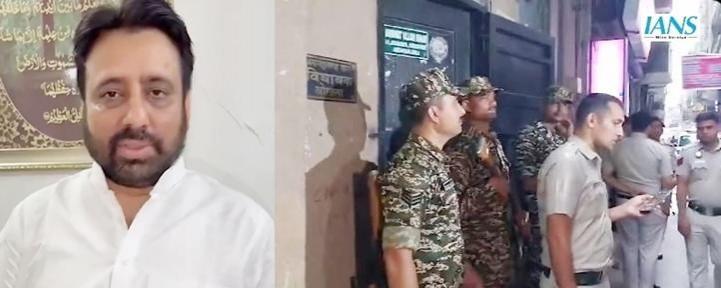
The political landscape of Delhi has been stirred up once again with the arrest of Aam Aadmi Party(AAP) MLA Amanatullah Khan. The arrest followed a raid by the Enforcement Directorate (ED) at Khan's residence in Delhi's Okhla. The raid was part of a broader investigation into alleged irregularities in the recruitment of staff for the Delhi Waqf Board, conducted under the provisions of the Prevention of Money Laundering Act (PMLA).
The ED, accompanied by Delhi Police and CRPF personnel, conducted the raid, which has stirred up a political storm. Khan, in response, took to social media early in the morning, posting a video to inform the public about the raid. The AAP leaders, including Manish Sisodia and Sanjay Singh, rallied behind Khan, accusing the BJP and the ED of attempting to stifle dissent. The controversy traces back to September of the previous year when Khan was arrested by the Anti-Corruption Branch (ACB) over alleged financial misappropriation and other irregularities in the functioning of the Delhi Waqf Board. The BJP seized on the opportunity to criticise AAP following the raid, accusing the party of widespread corruption, particularly in the recruitment of staff for the Delhi Waqf Board.
The case against Khan is complex and involves multiple layers of legal and political implications. According to the ACB, the first FIR in this case was registered in January 2020 under Section 7 of the Prevention of Corruption Act, in conjunction with Section 120B of the Indian Penal Code (IPC). Subsequently, Section 13 of the Prevention of Corruption Act and Section 409 of the IPC were added to the case.

During the investigation, a witness came forward regarding the tenancy of Waqf properties. This individual informed the ACB that in 2021, he had submitted a bid for a Waqf Board shop at Fatehpuri Masjid. His bid, amounting to Rs 30,000, was the highest, and he was summoned to the Delhi Waqf Board office to complete the formalities.
However, he was asked to pay a sum of Rs 10 lakh, which he refused. Consequently, he was directed to withdraw from the bidding process. Khan then accepted a lower bid of Rs 19,000 from another bidder, resulting in a financial loss to the Delhi Waqf Board. The ACB also obtained a statement from a female employee of the Delhi Waqf Board, who alleged that files related to the Waqf Assets Management System of India (WAMSI) project were removed at Khan's behest. She claimed Khan did not want transparency in matters related to Waqf Board properties as it would expose his alleged illegal activities.
The ED alleged that Khan had acquired 'huge proceeds of crime' in cash through illegal staff recruitment at the Delhi Waqf Board, which he then used to purchase immovable assets in the names of his associates. The ED stated that the October searches were related to the illegal recruitment of staff at the Delhi Waqf Board and Khan's alleged personal gains from unfairly leasing Waqf Board properties during his chairmanship between 2018 and 2022.
In February, the Delhi High Court denied immediate relief to Khan against the ED summons in a Rs 36 crore property case, which came to light through diaries belonging to his close aide Hamid Ali Khan, suggesting high-level transactions between Amanatullah Khan and Javed Imam Siddiqui, including the purchase of a Rs 36 crore plot in Tikona Park, Okhla. Hamid Ali Khan was arrested by Delhi Police's anti-corruption branch unit in September 2022.
In April, the Supreme Court refused to grant relief to Khan, expressing displeasure over his repeated absences from ED summonses. Days after the Supreme Court's decision, the ED interrogated Khan for 13 hours and subsequently informed the Rouse Avenue Court that it would not withdraw its complaint against Khan for non-compliance with its summons in the money laundering case, which ultimately led to his arrest.
Related









